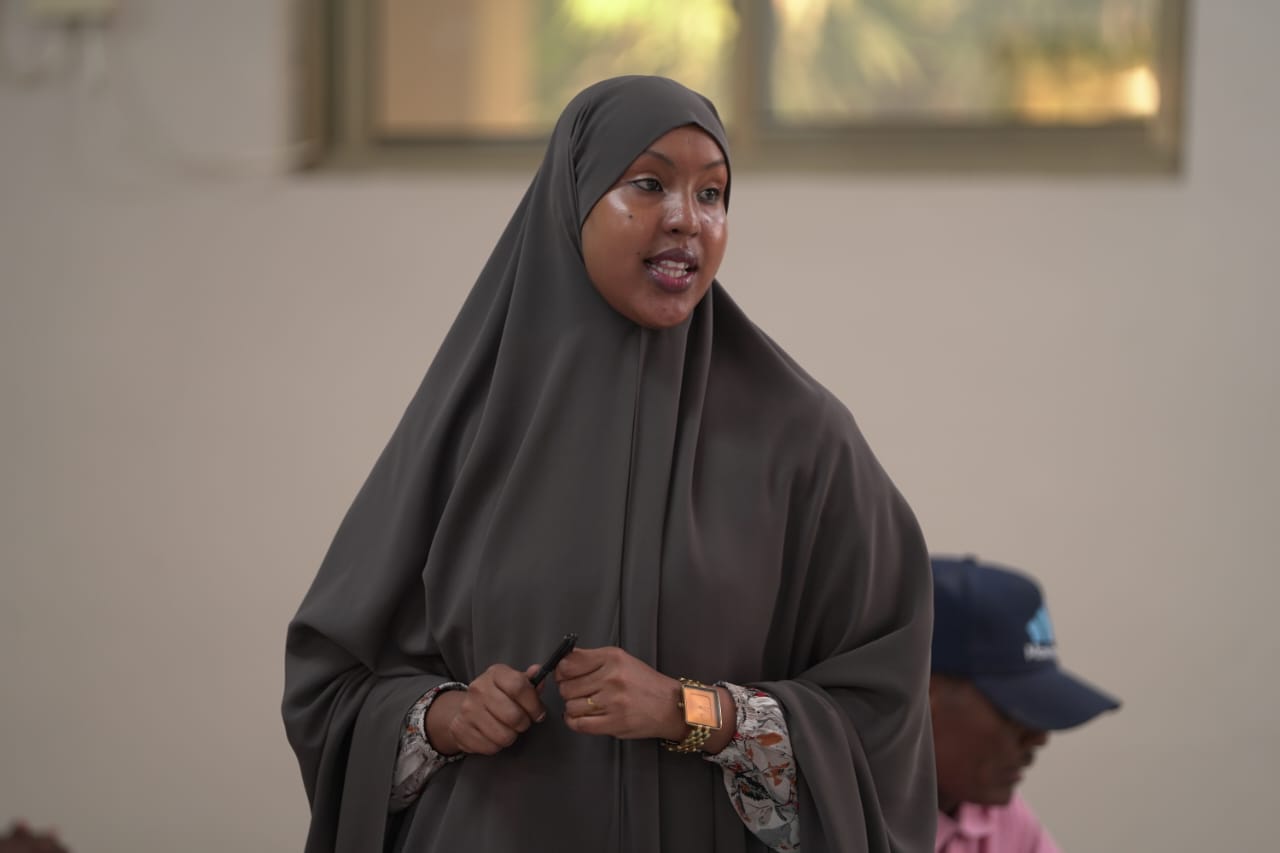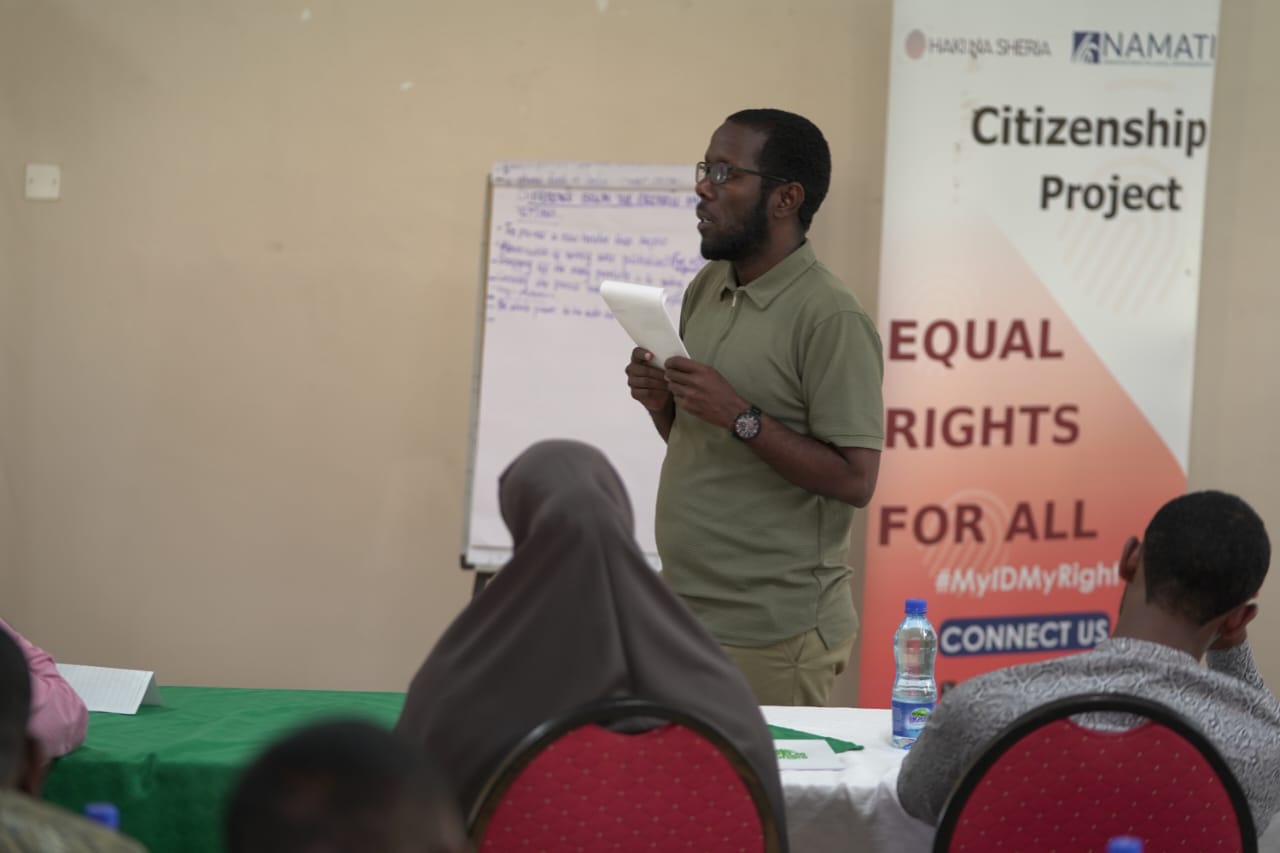
 Umulkheir Ahmed Shale, Haki Na Sheria's head of paralegal,
during the training of North Eastern journalists in Garissa on Monday/STEPHEN ASTARIKO
Umulkheir Ahmed Shale, Haki Na Sheria's head of paralegal,
during the training of North Eastern journalists in Garissa on Monday/STEPHEN ASTARIKO Abdimalik Hajir, the acting manager, Haki na Sheria, during
a one-day training of Northeastern-based journalists in Garissa/STEPHEN ASTARIKO
Abdimalik Hajir, the acting manager, Haki na Sheria, during
a one-day training of Northeastern-based journalists in Garissa/STEPHEN ASTARIKOCivil society groups have asked the government to move from
policy pronouncements and promises to tangible action to address gaps and
systemic injustices in the new ID registration guidelines.
In February, President
William Ruto signed a decree eliminating vetting requirements for residents of
Northeastern Kenya applying for national identification documents.
Before Ruto’s decree,
vetting subjected certain Kenyans from specific regions, ethnic groups
or religious backgrounds to additional
scrutiny when applying for the documents.
Unlike other citizens,
they had to appear before a vetting committee, provide extra documentation and meet
additional conditions.
Rights groups, however, say that while the government had, through the executive order, declared vetting as
unconstitutional, six months later, it was evident that ID applicants were still encountering numerous challenges to acquire
the document.
A statement jointly signed by Haki Na Sheria Initiative,
Nubian Rights Forum, Namati Kenya, Haki Center, Pastoralists Rights and
Advocacy Network and Pastoralists Women for Health and Education
urges the government to be
consistent on the matter.
Following the abolition of vetting, the government, through
the Ministry of Interior, gazetted new ID registration guidelines.
Now, the new ID process requires applicants to provide proof
of citizenship (birth certificate and parents ID) and a letter of introduction
from the chief.
Parents are also required to appear in person to put a
thumbprint on the application form and follow-up from the chief to again re-verify
the applicant.
Thereafter, the application is forwarded to the Directorate
of Criminal Investigations and National Intelligence Service for
additional verification before an individual can get their identity card.
According to the rights groups, for millions of Kenyans,
mainly from majority Muslim communities and other minority ethnic groups, the
promise to end ID vetting remains only on paper.
“In practice, the new structure for ID applications, which
applies to only some sections of Kenyans, still creates excessive demands on
applicants while also retaining the unchecked power of officials mainly chiefs
to determine whether an applicant gets an ID, even when the applicant provides
government-issued supporting documents as part of their application,” the statement reads.
“This, coupled with other enduring administrative challenges, including and not limited to widespread corruption, prohibitive and
inconsistent application fees, and distance from registration offices or Huduma
centres, too many Kenyans still face significant barriers when seeking ID cards."
The lobbies said that
the constitution does not permit a two-tiered system, where
different ID application standards are imposed on sections of Kenyan citizens
based solely on religious background or ethnicity.
“We urge the government to finally address this
long-standing injustice and ensure every Kenyan enjoys equal,
non-discriminatory access to citizenship documents.”
The rights groups have also called for the amendment or
repeal of sections of the law that purportedly provide the legal framework for
vetting.
They also want the implementation of affirmative action
measures to issue identification to all Kenyans, especially those previously
excluded from accessing the documents due to historical existence of discriminatory
vetting.
“Expanding the number of registration and identification
offices and resourcing of these offices, especially in underserved areas of
Kenya.
The groups also called for reduction or elimination
of inconsistent high fees for ID renewal and birth certificate applications.
They urged the government to seize the opportunity to implement its pledge on Sustainable Development Goals SDG16:9 and fulfill its promise of nationality.













